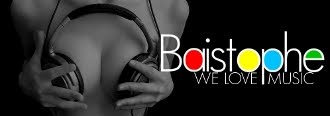On the heels of two highly-acclaimed duet recordings with bassist Daniel Yvinec (the latter recently named to head France's National Jazz Orchestra), pianist Guillaume de Chassy last year released a remarkable Piano solo (Bee Jazz, 2007). You see the trend: duo, solo—the band can't get any smaller, so de Chassy has released a record for piano trio.
It's characteristic of de Chassy's deliberate premeditation that he changes formats in this incremental way. Everything about the new record reflects this same careful musical intelligence.
The pianist's band mates have been effectively chosen. Bassist Stéphane Kérécki plays with a stolid, guitar-like musicality not unlike Yvinec's: strumming, he sometimes seems the star of the show ("Wish You Were Here," "Ida Lupino"). Drummer Fabrice Moreau, meanwhile, can provide both Paul Motian-like accents as well as bottom-heavy propulsion (evident in particular on the three takes of the slightly self-consciously extemporaneous "What Do You Mean?").
Many elements of de Chassy's musical universe are present in the repertoire. Echoing Chansons sous les bombes (Bee Jazz, 2004), the duet program with bassist Yvinec of classic French songs, there is Charles Trenet's "Coin de rue." A new reading of de Chassy's "Parenthèse" (an ephemeral whisper on the earlier solo-piano record) here reveals the beautiful inevitability of the composition in the trio setting.
De Chassy has been compared by more than one listener to Paul Bley, and rightly so. It therefore requires a little chutzpah to include "Ida Lupino," perhaps more closely associated with the Montreal pianist than any other composition. De Chassy nevertheless makes the number his own (he lets bassist Kérécki play the signature lilting figure throughout much of the performance), without radically overhauling the piece; what comes through is confidence in his own musical voice.
There are furthermore countless classical echoes—in "Après un rêve," based on a theme by Fauré; in the formal foundations underlying "Choral" and "Nocturne." De Chassy the soloist is anything but anodyne; he takes considerable risks, but never sounds free in an untethered way. Both the varied harmonic resources and the discipline in his playing in fact owe a lot to this classical pedigree.
All of the aforementioned strong points, however, recede before the album's opener, an exquisite setting of Pink Floyd's "Wish You Were Here." Some listeners will be reminded of the Bad Plus's similar borrowings from the classic FM rock song book, and while I don't think they are trying to be cute any more than de Chassy is, this Pink Floyd cover seems to plumb greater depths. The trio's statement of the theme is achingly lovely; the reworking of the plodding middle section evokes an intimate yet nearly existential dread akin to the opening music of the third act of Tristan und Isolde. Perfect in every respect.
It's characteristic of de Chassy's deliberate premeditation that he changes formats in this incremental way. Everything about the new record reflects this same careful musical intelligence.
The pianist's band mates have been effectively chosen. Bassist Stéphane Kérécki plays with a stolid, guitar-like musicality not unlike Yvinec's: strumming, he sometimes seems the star of the show ("Wish You Were Here," "Ida Lupino"). Drummer Fabrice Moreau, meanwhile, can provide both Paul Motian-like accents as well as bottom-heavy propulsion (evident in particular on the three takes of the slightly self-consciously extemporaneous "What Do You Mean?").
Many elements of de Chassy's musical universe are present in the repertoire. Echoing Chansons sous les bombes (Bee Jazz, 2004), the duet program with bassist Yvinec of classic French songs, there is Charles Trenet's "Coin de rue." A new reading of de Chassy's "Parenthèse" (an ephemeral whisper on the earlier solo-piano record) here reveals the beautiful inevitability of the composition in the trio setting.
De Chassy has been compared by more than one listener to Paul Bley, and rightly so. It therefore requires a little chutzpah to include "Ida Lupino," perhaps more closely associated with the Montreal pianist than any other composition. De Chassy nevertheless makes the number his own (he lets bassist Kérécki play the signature lilting figure throughout much of the performance), without radically overhauling the piece; what comes through is confidence in his own musical voice.
There are furthermore countless classical echoes—in "Après un rêve," based on a theme by Fauré; in the formal foundations underlying "Choral" and "Nocturne." De Chassy the soloist is anything but anodyne; he takes considerable risks, but never sounds free in an untethered way. Both the varied harmonic resources and the discipline in his playing in fact owe a lot to this classical pedigree.
All of the aforementioned strong points, however, recede before the album's opener, an exquisite setting of Pink Floyd's "Wish You Were Here." Some listeners will be reminded of the Bad Plus's similar borrowings from the classic FM rock song book, and while I don't think they are trying to be cute any more than de Chassy is, this Pink Floyd cover seems to plumb greater depths. The trio's statement of the theme is achingly lovely; the reworking of the plodding middle section evokes an intimate yet nearly existential dread akin to the opening music of the third act of Tristan und Isolde. Perfect in every respect.
1. Wish you were here
2. Coin de rue
3. Choral
4. What do you mean ? (# 1)
5. Après un rêve (d'après Gabriel Fauré)
6. What do you mean ? (# 2)
7. Ida Lupino
8. What do you mean ? (# 3)
9. Parenthèse
10. Nocturne
2. Coin de rue
3. Choral
4. What do you mean ? (# 1)
5. Après un rêve (d'après Gabriel Fauré)
6. What do you mean ? (# 2)
7. Ida Lupino
8. What do you mean ? (# 3)
9. Parenthèse
10. Nocturne





No comments:
Post a Comment